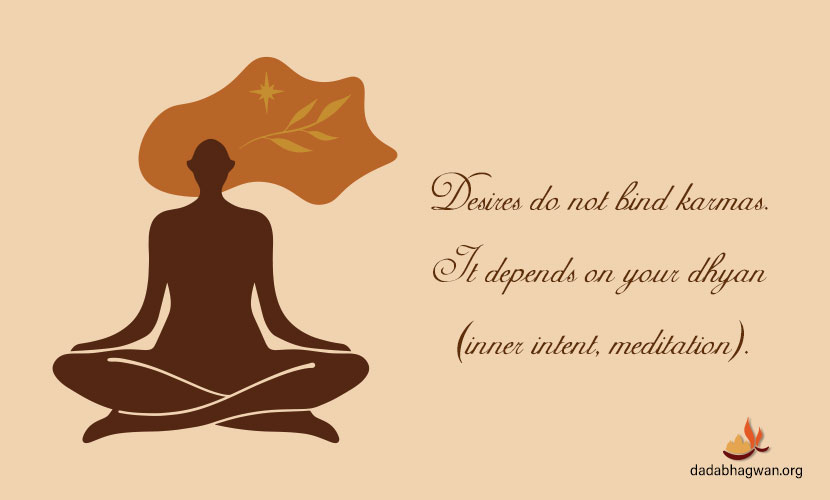Does our present and past life Karma depend on dhyan?
What Creates Karmas?
Questioner: You said that there is planning behind whatever one experiences now. In this process there is also kriyaman (effect of effect karma that is experienced through five senses in the same life), as well as sanchit (accumulated karmas from the past life), so then how is one to understand the karmas and the cause of those karmas?
Dadashri: That planning of the karmas (cause) is not dependent on kriya (that which occurs through thoughts, speech and acts). It depends on your dhyan (meditation, intent, bhaav). You may give a donation of five thousand rupees because someone pressured you to do so, but your dhyan at the time of giving was not true-exactly as it should have been, meaning it was not in agreement with your actions.
Questioner: I did not have a great desire to give.

Dadashri: No, it is not the desire (ichchha). There is no need for desire at all. Desires do not bind karmas. It depends on your dhyan (inner intent, meditation). Desire can be there or not. At the time of giving the money, if you feel in your mind that you would have never given the donation if that had not pressured you, then despite your outwardly altruistic actions, you will go into the animal kingdom because you became bound by this meditation called raudradhyan.
Questioner: What does dhyan depend on?
Dadashri: It depends on one's development. It depends on whatever Gnan has developed in you.
Even while doing something bad or hurtful, if your dhyan(mediation, inner state) is of a high level; you will bind punya(merit karmas). When a hunter kills a deer, if he repents heavily, 'Why did this action come to me? I have no choice but to do this to feed my wife and my children', then the dhyan has risen higher. Nature does not judge-see one's kriya (actions); it takes into consideration one's dhyan at the time of his actions. It does not even look at one's desires.
When someone robs you, the bhaav (intent; meditation; state of the mind) becomes raudra (violent and hurtful). Such intent occurs in the darkness (agnan, ignorance). Now what kind of bhaav occurs in the One where there is pure light; the knowledge of the Self ? He will say it is vyavasthit and will move on without any bhaav or abhaav (positive or negative reaction in inner intent).
*Chandulal = Whenever Dadashri uses the name 'Chandulal' or the name of the person Dadashri is addressing, the reader should insert his or her name for exact understanding.
subscribe your email for our latest news and events





